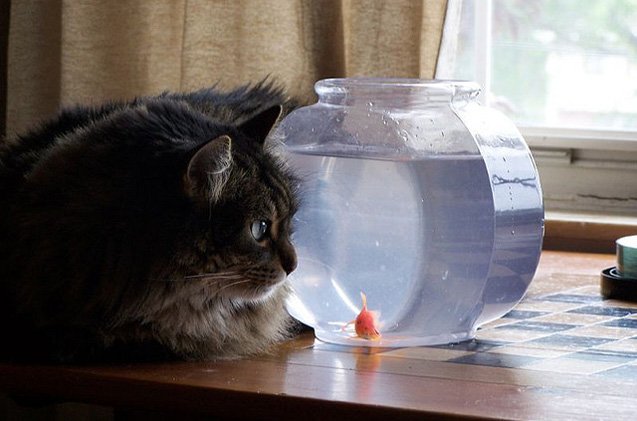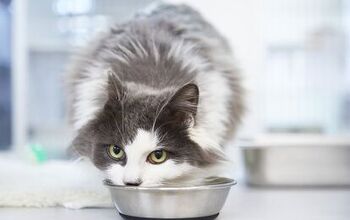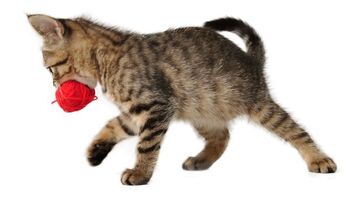Have you thought about giving your cat a homemade diet? We talk to a vet/cat food nutritionist and what he says will give you some food for thought!
When it comes to what you can feed your feline friend, you have quite a few choices, such as dry food, canned food, and raw food. Many pet parents even choose to feed their kitties a homemade diet that they prepare with fresh ingredients right in their own kitchen.
But, for those who are too busy to cook for their pets, and those who aren’t sure how to formulate a complete and balanced list of recipes for their cats, a brand called NomNomNow, which delivers freshly prepared pet food to your door, might be able to help.
To learn more about the benefits of feeding your cat a fresh, whole foods diet that doesn’t come in the form of kibble or in a can, we had a short chat with Dr. Shmalberg, the brand’s veterinary nutritionist. Check out what he had to share below.
Related: How to Transition Your Cat to New Food
What makes freshly prepared options superior to dry food, canned food, and raw food for felines?
Dr. Shmalberg: The fresh cat foods we carefully cook are designed to mimic the dietary preferences of cats (which are, unsurprisingly, similar to what wild cats eat).
As obligate carnivores, we know that cats thrive on high protein, moderate fat, and lower carbohydrate diets, which was the basis for how we designed our diets. Cats are also accustomed to getting most of their water in food, and the moisture content of our recipes will provide more water than found in kibble. Also, raw diets can pose a high risk to cats that may have reduced immune function, for example.
The ingredients in our diets are often very different from what you’d find in kibble and canned foods, and don’t carry the higher levels of bacteria found in raw foods.
We recognize that the best food for each cat is influenced by a number of factors, and there certainly are a number of diets that can be fed to promote health. We, however, have formulated NomNomNow for Cats in a manner we feel promotes health, is biologically and species-appropriate, and is supported by careful food safety protocols.
Related: Should You Change Your Cat’s Food?
What are the biggest misconceptions that cat owners have regarding nutrition for their animals?
Dr. Shmalberg: I frequently encounter two big misconceptions:
The first is the idea that cats cannot process or digest carbohydrates. Even wild cats consume some carbohydrates, found in their prey, and the preferred and evolutionary diet of the cat contains a low, but not trivial amount, of carbohydrates. Carbohydrates, in small amounts, are very well digested and absorbed by cats. And owners often forget or are unaware that cats, like dogs, use glucose (a sugar) for energy in their cells.
The second misconception is that a cat being overweight isn’t a huge issue if it’s being fed a healthy diet. The best diet in the world won’t reverse diabetes, for example, in a severely overweight cat unless calories are controlled. Diets that pre-measure portions for owners can be very helpful in getting this under control. A majority of the cats I see in my practice are overweight, and keeping a cat lean is one of the most fundamental things you can do to keep your cat healthy and extend its lifespan.
How much of an impact does nutrition, and how food is prepared, have on a cat’s health and longevity?
Dr. Shmalberg: Unfortunately, lifetime nutritional studies of cats, and other pet animals, aren’t something that we’ve seen from the scientific community, mainly because they are hard to perform and very expensive.
We certainly know that weight management is critically important for cats, which is why we have a proprietary algorithm, based on the weight and condition of each cat, to ensure that we keep them, or get them, lean. Lean cats are far less likely to have diabetes, which can be a significant illness in felines.
Research supports that giving cats more water in food can increase activity, reduce weight gain, and help to prevent certain urinary conditions. In addition, preparation of pet food, especially how it is cooked, affects both digestibility and safety. NomNomNow has created formulas that we feel are safe, highly digestible, and complete with the critical nutrients that allow cats to thrive.
What inspired you to work with NomNomNow?
Dr. Shmalberg: One of the most common requests I encountered as a veterinary nutritionist was the creation of a home-prepared diet for a pet. As a result, I knew that there was a huge demand for a high quality, fresh meal service for dogs and cats.
The founders of NomNomNow brought not only a vision for this to become a reality but also an ability to keep science and pet wellbeing at the center of their business decisions. This was refreshing in my role as an animal advocate, and I’ve been involved from the formulation of the very first recipes to the present.
How is your food better than a pet owner cooking their own cat food at home? Is it nutritionally better or is it just more convenient?
Dr. Shmalberg: Committed pet owners certainly can prepare food at home, and I have a small group of clients in my clinical practice that do this well. However, cooking at home, especially for a cat, requires diligence in following recommendations to ensure that your cat consumes all of their essential nutrients.
Cooking at home also doesn’t offer the advantages that NomNomNow does. We check to make sure nutrient levels are adequate, and we use a safe food preparation environment that minimizes the chance of contaminants.
The individualized portions we provide certainly help to manage calories, and there are a lot of overweight cats out there that could benefit.
Most of my clients, when they find a fresh product that they’re comfortable with, find the savings in time to be extremely valuable.
How do you come up with your recipes for cats?
Dr. Shmalberg: We currently offer two recipes for cats: Chicken Chow-Meow and Flavorful Fish Feast. Both recipes were deliberately formulated to match the diet that most cats, as obligate carnivores, were built to eat. These diets are high in protein, low in carbohydrates, and include adequate moisture within the food. This is also based on cat preferences, as shown in scientific study.
In one of the videos on your website, you discuss the potential adverse effects of using organ meats like liver. But I also noted that chicken liver is part of the Chicken Chow-Meow recipe. Can you explain why?
Dr. Shmalberg: The chicken liver we included in the chicken recipe is used to enhance the flavor profile of the diet and complement the vitamins and minerals in our NomNomNutrient mix.
It’s correct that some organ meats, depending on the animals from which they are derived, can contain heavy concentrations of contaminants and metals. Organ meats can be problematic if they’re being used as the sole source of essential nutrients because they have a lot of naturally occurring nutrient variability.
Our recipe only includes small amounts of chicken liver, on which we performed thorough testing. We also used extreme diligence in finding the right supplier. It’s this very thorough testing that allowed us to feel comfortable including it in the chicken recipe.
Are you or your staff available to consult with pet parents one-on-one if they have questions or require a customized diet for their cat?
Dr. Shmalberg: While I don’t consult with our customers one-on-one, I’m actively involved in making sure that each pet is getting the best diet [through NomNomNow].
As appropriate, I make recommendations to our account managers about what’s best for each pet. Sometimes, a pet needs fewer calories, or needs to switch to a different protein by trying one of our other recipes.
In rare cases, a pet might not be a good candidate for NomNomNow, and a referral to a board-certified veterinary nutritionist (acvn.org) may be in the customer’s best interest.
We see ourselves as partners with our customers, working together to maintain excellent health for their pets, using nutrition as preventative medicine.
How does a cat owner go about choosing the recipes that are best for their pet?
Dr. Shmalberg: NomNomNow is an easy-to-use subscription. Our dedicated and knowledgeable customer experience team and our unique algorithm do all of the calorie calculations for our customers.
Just like our dog owners, cat owners can go to NomNomNow.com, enter some details about their cat, such as weight, age, and activity level, and our system calculates the precise caloric needs of that cat. We find that most other pet foods over-calculate caloric needs, which certainly doesn’t help the huge number of overweight cats out there.
Both of our recipes can be fed to cats of all life stages. When customers are choosing between our two recipes, we often advise them to select the recipe with the most similar protein to the cat’s current diet.
How are the recipes prepared? Is it the same as a pet owner cooking these meals in their own kitchen, or is there more of an industrial manufacturing process involved?
Dr. Shmalberg: All of our meals are handmade by the dedicated and highly skilled staff in our kitchen.
We use unique preparation processes to gently cook the ingredients, individually package meals, and pack boxes to be promptly shipped to our customers all over the country, all with an extremely high level of efficiency and safety.
We only prepare the exact amount of food ordered by our customers, which is why our kitchen produces zero food waste.
From where do you source the ingredients that you use? Do you use organic ingredients and/or non-GMO ingredients?
Dr. Shmalberg: All of our ingredients are human-grade and sourced from the same suppliers that are used by restaurants, and they aren’t subjected to long periods of storage.
The NomNomNutrient mix contains vitamins and minerals that are complementary to our food, and it’s perfectly balanced with nutrients for all life stages. It includes vitamins B1, B2, B12, and D, just to name a few.
Finally, with all of the scary recalls that occur so often in the pet food market, what steps are you taking to ensure your cat food isn’t contaminated or harmful in any way?
Dr. Shmalberg: One of the things that really sets us apart is that we track each ingredient with the highest level of attention, from the moment it arrives in our kitchen, to the moment it leaves our facility en route to a customer’s doorstep. We have very robust internal and external laboratory testing of the foods for pathogenic bacteria, which complements our extensive food safety protocol.
So there you have it: if you’re considering another convenient option for giving your kitty the highest quality nutrition possible, fresh food that’s cooked and delivered might be a good choice. If you have questions regarding what diet would be best for your particular pet, though, consult with your veterinarian first.

























